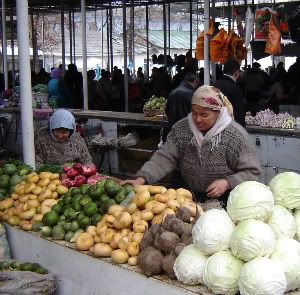Will it be a Long, Hot Summer in Central Asia?

Central Asians have been through a lot over the last century. They are not strangers to famine and hardship, but that does not mean that they will just be able to brush off what is turning out to be a global crisis in food prices. Over the last several weeks, there has been increased media attention to the rising prices of foodstuffs around the world. The Economist has called it the “Silent Tsunami” in Asia, and the Washington Post has been looking at its affects in Africa. But, what about Central Asia?
According to most articles on the quickly evolving food crisis around the world, there are a couple of different factors that seem to be colliding to push prices up. The first relates to increasing consumption of meat, especially in China and India. As these countries become more carnivorous as part of their prosperity, they require more livestock, and livestock requires more grain. Wheat and rice, in particular, are suddenly in short supply as this increased demand becomes exacerbated by speculative grain stockpiling and countries limiting their exports in order to protect their own people. Kazakhstan, for example, has completely shut off its export of wheat in order to feed its own people. Finally, the rapidly rising price of grains worldwide is further propelled by the rising price of oil. Even when import markets are able to get their hands on the grain at prices increased by short supply, the value is further increased by the climbing costs of transportation.
This type of situation is, of course, going to affect the poorest people in the world the most. Those people who are already living hand to mouth to feed themselves suddenly are faced with unexpected costs, which they may not be able to handle. While most people in this category live in Africa and East Asia, there is also a substantial population in Central Asia which is always just scraping by to make ends meet. While Kazakhstan is likely to be the best off of the bunch given its own wheat supply and the general condition of the economy in that country, the Kazakh rumor mill is already buzzing about potential famine.
If that is the case, one can only expect that the situation in the other four countries is likely to be far worse. Tajikistan is probably the most vulnerable. Having just emerged from a humanitarian tragedy during the winter as children and elderly died when losing access to heat, the people of Tajikistan will likely be the hardest hit by rising food prices. With most of the country’s adult men working in Russia and Kazakhstan, Tajikistan’s farms are suffering from a serious lack of manpower. While families are staying alive on remittances, it can be expected that those remittances will be stretched further as the cost of feeding one's families catapults. Furthermore, Tajikistan’s weak government offers its citizens little social safety net to take up the slack. Kyrgyzstan will undoubtedly face the same problems. Also making ends meet through remittances from working family-members abroad, many Kyrgyz citizens will likely face extreme difficulties feeding themselves this summer. In Turkmenistan and Uzbekistan, the question remains as to how effective these neo-socialist states can be in providing for their people by subsidising foodstuff. Turkmenistan has it somewhat easier since its population is much smaller, and state revenues per capita continue to grow with the cost of oil and gas. Uzbekistan, however, could be in real trouble as its large population tries to stretch already tight budgets even further to sustain rural families.
Thus far, this issue has not been highlighted much in the local media, but it is already being discussed in mahallas and auls throughout the region as Central Asians brace themselves for what could be a difficult summer. The question is whether thick skins and ingenuity established over decades of crises can help the people of the region make it through this latest global economic scare or whether the hot summer in Central Asia will result in unexpected social tragedies or even civil unrest.



3 Comments:
I agree that Kazakhstan and Turkmenistan will come out of this crisis relatively unharmed, given their ability to offset higher food prices with their oil and gas exports.
Tajikistan and Kyrgyzstan will probably suffer the most. However, given their traditional diets and source of food (much of it local), it will not be as bad as Haiti, Egypt, etc.
Xingjiang (East Turkestan) will be interesting. I don't know how much price control the CCP has on grains. However, given the huge Han Chinese population there and the need to truck all the rice across the country, food prices may go a little crazy.
Vse verno skazano
Absolutely agree!
Post a Comment
<< Home